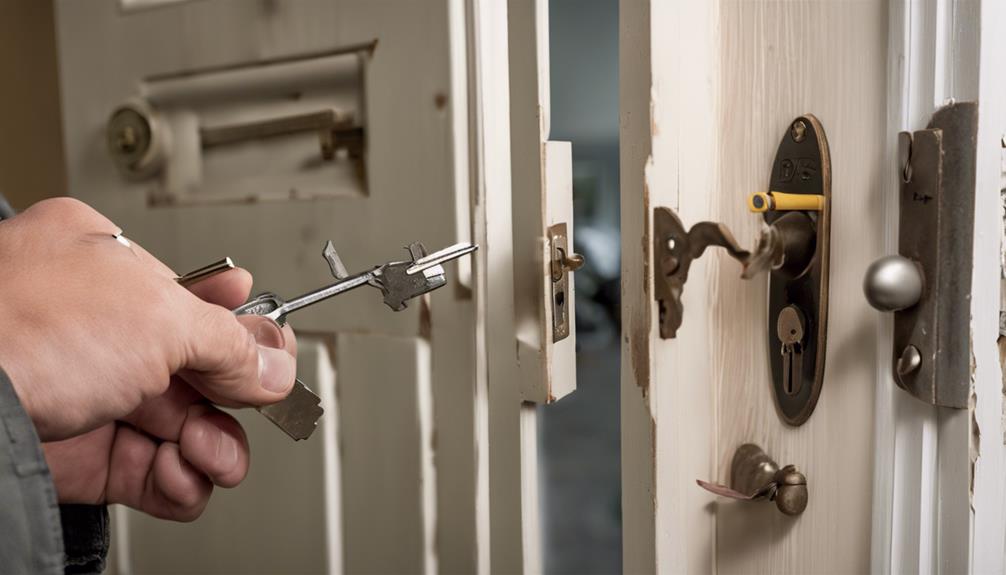In emergencies, choose re-keying when you've lost your keys or suspect unauthorized access. It's a quick, cost-effective solution that only changes the lock internals, leaving your existing hardware intact. Plus, it usually takes less time than a full lock replacement, getting you back to safety faster. If your locks are old, damaged, or you've experienced a break-in, lock replacement is essential for your security. Weigh your immediate needs against long-term security benefits to make the right choice. There's more to evaluate before making your decision, so keep exploring your options for better security solutions.
Key Takeaways
- Choose re-keying when you've lost keys or suspect unauthorized access, as it quickly restores security at a lower cost.
- Re-keying is ideal for maintaining existing locks in good condition, saving time and money compared to lock replacement.
- Opt for lock replacement if locks are old, damaged, or if a recent break-in has occurred, ensuring enhanced security with new technology.
- In emergencies, re-keying can typically be completed in under an hour, providing a swift resolution to security concerns.
- Weigh the urgency of the situation; re-keying suits minor issues, while replacement is essential for serious security breaches.
Understanding Re-keying
When you find yourself in a situation where security is a concern, understanding re-keying can be essential. It's a practical, quick solution that allows you to regain control over your locks without the need for a full lock replacement.
If you've lost your keys or suspect unauthorized access, re-keying your existing locks can be an effective way to enhance your security without the expense and hassle of new locks.
In emergencies, you might wonder whether to rekey or replace your locks. Rekeying involves changing the internal pins of your existing locks, so old keys no longer work. This can be a faster and more economical emergency security solution.
Instead of investing time and money into new hardware, you can secure your home or business efficiently.
If you're looking to provide assistance to others in similar situations, understanding the nuances of re-keying vs lock replacement can empower you to offer informed recommendations.
Understanding Lock Replacement
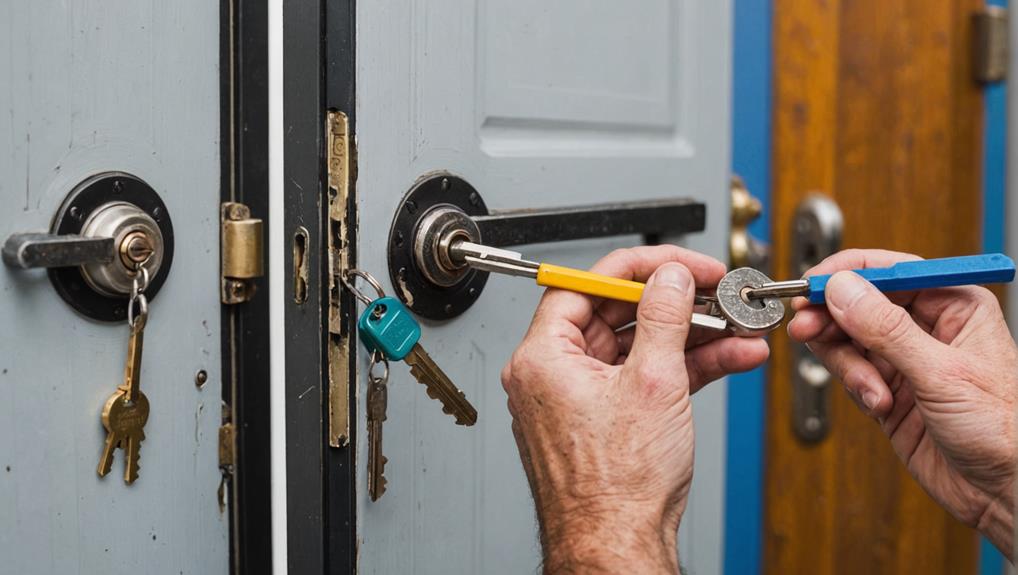
When you're considering lock replacement, it's crucial to understand your reasons for making the change.
Different types of locks offer various levels of security, and knowing what's available can help you choose wisely.
Factors such as the quality of the lock, the complexity of the installation, and any additional features can greatly impact the overall costs involved.
Additionally, understanding lock replacement costs can help you make a sound investment.
Plus, you'll want to weigh the costs and factors involved to guarantee you're making a sound investment.
Reasons for Lock Replacement
While some may consider re-keying as a quick fix, there are several compelling reasons to opt for lock replacement.
First, if your locks are old or worn out, they may not provide the level of security you need. In an era where safety is paramount, you don't want to risk your home or business's security with outdated locks.
Additionally, if you've recently experienced a break-in or lost your keys, the urgency of lock replacement becomes clear. Emergency lock rekeying may seem sufficient, but it doesn't address the potential vulnerabilities in your current lock system.
Replacing the lock guarantees that any previous access points are eliminated, providing peace of mind.
Moreover, if you're upgrading your home or business's security system, newer locks often come with advanced features like smart technology or better resistance to forced entry. This not only enhances your security but could also lower your insurance premiums.
Ultimately, when facing lock replacement urgency, you're not just changing a lock; you're investing in your safety and the security of those you care about.
Types of Locks Available
Understanding the types of locks available is essential, especially during a replacement. Knowing your options helps you make informed decisions that can better serve your community and those in need.
- Deadbolts: These locks provide extra security by requiring a key or thumb turn from the inside, making it harder for intruders to gain access.
- Smart Locks: These modern options offer keyless entry through smartphones or codes, making them convenient and user-friendly.
- Padlocks: Portable and versatile, padlocks can secure gates, sheds, and lockers, offering flexibility in various situations.
When considering a lock replacement, think about the security needs of the people you aim to protect. For example, a family may require more robust deadbolts for their home, while a community center might benefit from smart locks for easier access.
Each type of lock serves a unique purpose, and understanding these can help you choose the best fit. By selecting the right lock, you're not just improving safety; you're also fostering a sense of security for everyone involved.
Cost Considerations and Factors
Replacing a lock involves various cost considerations that can impact your budget. First, you need to think about the type of lock you want to install. High-security locks often come with a higher price tag, but they offer better protection.
You should also consider labor costs; hiring a professional locksmith can add to your expenses. If you're in a hurry or facing an emergency, those fees might increase.
Another factor is whether you need additional parts, like a new deadbolt or strike plate. These extras can quickly inflate your overall costs.
When you're looking to serve others, you might also want to factor in the long-term benefits of investing in a quality lock. A reliable lock enhances safety for not just you but also your family or clients.
Lastly, remember to check if your insurance policy covers lock replacement, as this can help alleviate some financial burden.
Weighing these cost considerations will empower you to make informed decisions and guarantee that you're providing the best possible security for those you care about.
Cost Comparison
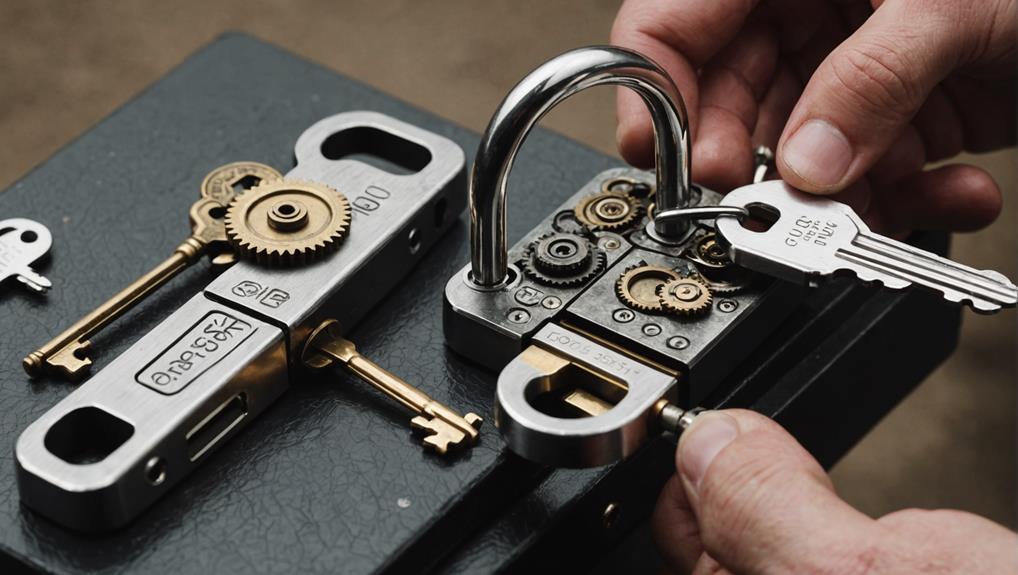
When you're faced with a lock emergency, you'll quickly realize that the costs of re-keying versus lock replacement can vary greatly. Understanding these costs can help you make the best decision for your situation, especially when you're focused on serving the needs of others.
DIY vs. professional costs can markedly influence your choice, as many people may not be aware of the potential savings from re-keying.
- Re-keying typically costs between $50 and $150, depending on the locksmith and the complexity of your locks.
- Lock replacement can range from $100 to $300, factoring in lock type, labor, and additional hardware.
- Choosing re-keying can save you money and time, allowing you to focus on helping those in need.
Re-keying is usually the more economical option, particularly if the existing locks are in good condition. It allows you to maintain security without the hefty price tag of new locks.
However, if the locks are old, damaged, or not functioning properly, investing in a lock replacement may be the safer route.
Security Implications
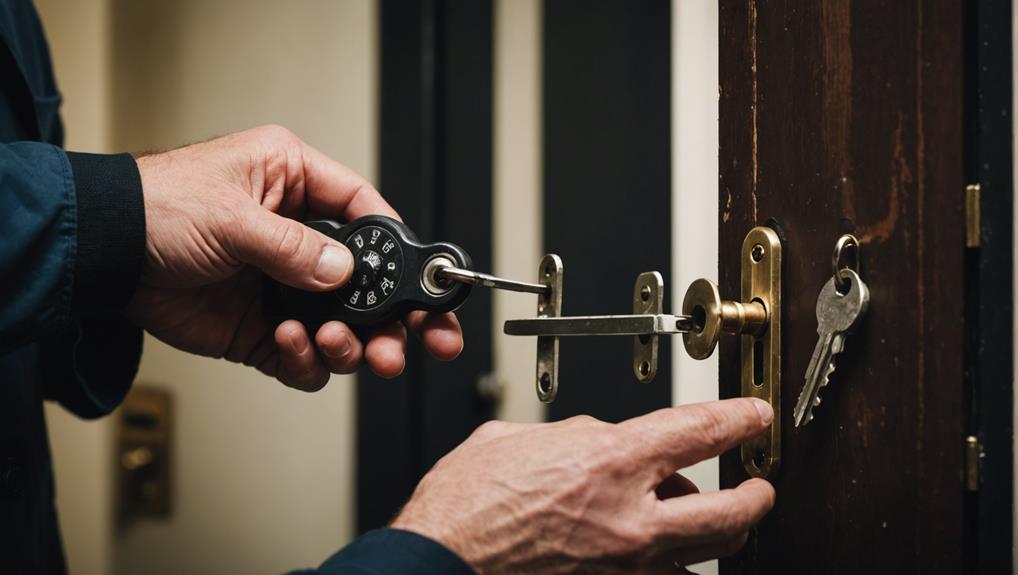
In an emergency, many people often overlook the security implications of choosing between re-keying and lock replacement. Each option carries distinct considerations that can notably affect your safety and that of your loved ones.
Re-keying keeps the existing lock but changes the internal mechanism, making previous keys useless. This option is often quicker and can maintain a level of security if the lock itself is in good condition. On the other hand, lock replacement offers a fresh start, especially if the lock is outdated or compromised.
Here's a quick comparison to help you evaluate:
| Re-keying | Lock Replacement |
|---|---|
| Quick and cost-effective | May take longer and be pricier |
| Retains existing hardware | New hardware enhances security |
| Good for minor security concerns | Best for serious breaches |
| Ideal for regular maintenance | Recommended after a security incident |
Ultimately, your choice should align with your security needs and the urgency of the situation. By understanding the implications of each option, you can make an informed decision that prioritizes safety for yourself and those you serve.
Emergency Situations
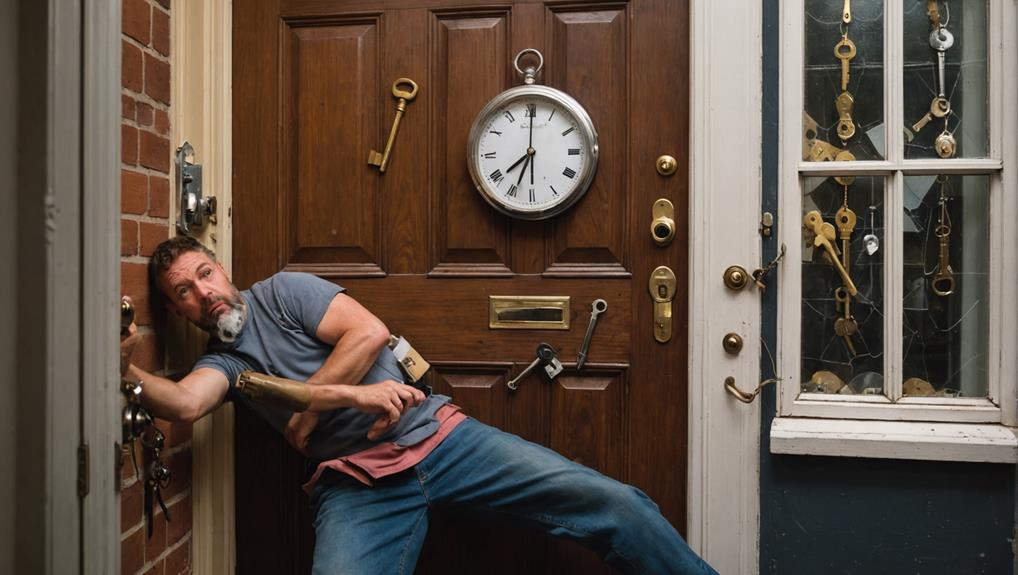
Emergencies can strike at any moment, making it vital to respond swiftly and effectively.
When a situation arises, knowing whether to re-key or replace your locks can greatly impact your safety and peace of mind. Re-keying vs. lock replacement is an important decision that every homeowner should understand.
Here are some common emergency scenarios you might face:
- You've lost your keys and fear they're in the wrong hands.
- You've experienced a break-in and need to secure your home immediately.
- You've just moved into a new place and want to guarantee your safety.
In these moments, your instinct might be to replace the entire lock.
However, re-keying can often be a faster, more affordable solution. With re-keying, you can change the lock's internal mechanism, rendering old keys useless while keeping the existing hardware intact.
This option allows you to regain control over who's access to your space without the hassle of a complete lock replacement.
Time Considerations
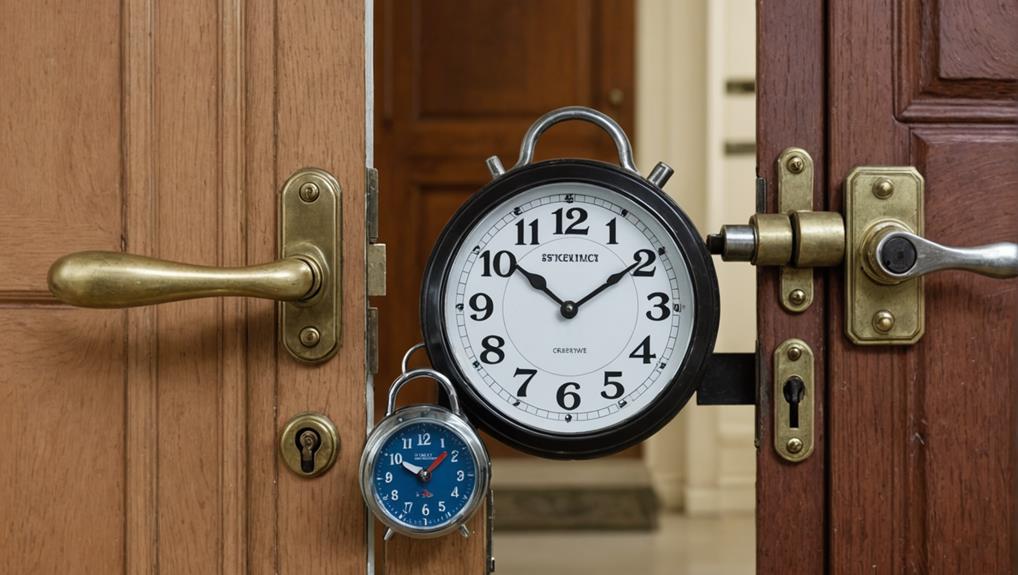
Considering how quickly emergencies can unfold, time is a significant factor in deciding between re-keying and lock replacement. When you find yourself in a situation where immediate access is essential, re-keying often proves to be the faster option. It typically takes less time to complete because it involves changing the lock cylinder rather than removing and installing a new lock.
For many, opting for emergency re-keying services can streamline the process and provide peace of mind. If you're in a hurry to guarantee safety or regain access, re-keying might just be the solution you need.
On the other hand, if your lock is severely damaged or outdated, a full replacement might be necessary. However, keep in mind that this process can take longer, especially if you need to order a specific type of lock or wait for a technician's availability.
In emergencies, your priority should be to restore security as quickly as possible. By weighing the time it takes for each option, you can make a better-informed decision that meets both your needs and those of others who rely on your timely intervention.
Choosing re-keying can help you act swiftly, while still providing the protection everyone deserves.
Types of Locks
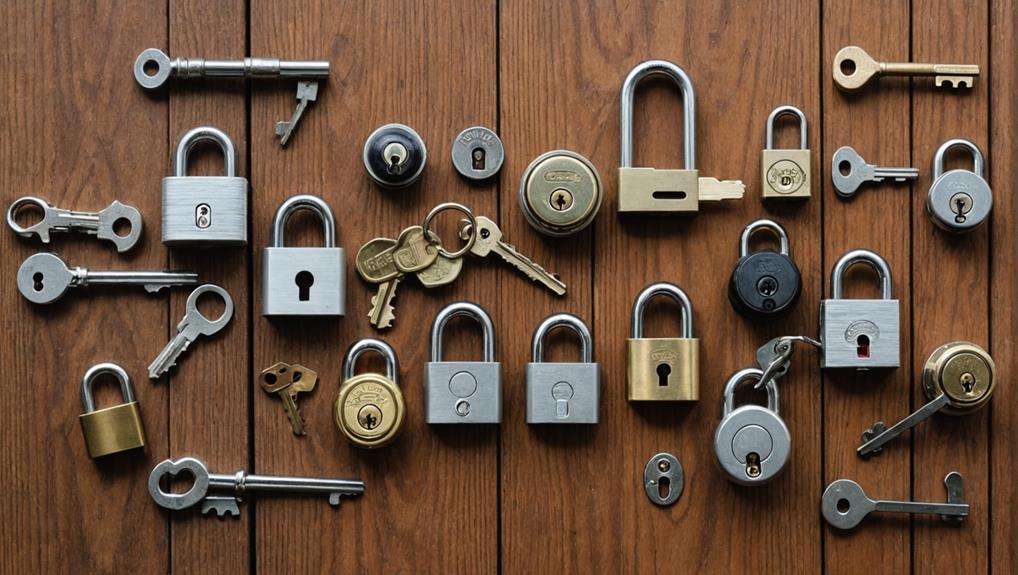
When you're choosing a lock, understanding the different types is essential for your safety.
Deadbolt locks offer enhanced security, while knob locks provide a more basic level of protection.
Additionally, some homeowners may consider smart locks, which can integrate with home automation systems and provide remote control options, making them a popular choice for those seeking convenience and security benefits the pros and cons of smart locks.
If you're tech-savvy, smart locks could be the perfect fit, offering features that can elevate your home security.
Deadbolt Locks Explained
Deadbolt locks are a crucial element of home security, providing an extra layer of protection against unauthorized entry.
They're more robust than standard spring bolt locks, making them a preferred choice for many homeowners.
Understanding the different types of deadbolt locks can help you serve your community better by advising others on the best options for securing their homes.
- Single Cylinder Deadbolts: These use a key on the outside and a thumb turn on the inside, ideal for doors with no windows.
- Double Cylinder Deadbolts: Requiring a key on both sides, these provide enhanced security but can be a fire hazard in emergencies.
- Smart Deadbolts: These offer keyless entry options, often integrating with home automation systems to enhance convenience and security.
When you choose deadbolts, consider your environment and specific security needs.
Educating others about these options empowers them to make informed decisions about their home security.
Knob Locks Overview
How secure are your doors with knob locks? While they serve a purpose, it's important to understand their limitations. Knob locks are commonly used on interior doors and can be easy to install, but they often lack the sturdiness needed for exterior doors.
Here's a quick overview of different types of knob locks:
| Type | Description |
|---|---|
| Standard Knob | Basic design, typically used for interior doors. |
| Keyed Knob | Features a keyhole for added security, mainly for exterior use. |
| Privacy Knob | Designed for bathrooms and bedrooms, allowing locking from the inside only. |
Knob locks can be vulnerable to forced entry due to their weaker construction compared to deadbolts. If you're looking to enhance security, consider combining knob locks with deadbolt locks for greater peace of mind. You'll be better equipped to protect your home and those you serve. Always assess your security needs to determine if knob locks are the right choice for your situation.
Smart Locks Features
Smart locks increasingly offer innovative features that enhance home security and convenience. These advanced locks not only keep your home safe but also make it easier for you to serve your family and guests.
Here are some key features to evaluate:
- Remote Access: Control your locks from anywhere using your smartphone, making it easy to grant access to visitors even when you're away.
- Keyless Entry: Say goodbye to fumbling with keys. With smart locks, you can use codes or biometric scans for quick, secure entry.
- Activity Monitoring: Receive notifications and view access logs to see who enters and exits your home, ensuring you're always informed.
Choosing a smart lock can be a game-changer, especially if you care about the safety of those you love.
With features designed to simplify your life, smart locks provide you with peace of mind while allowing you to focus on what truly matters—serving others.
Whether you're expecting guests or just want to enhance your home security, smart locks are a practical solution that adapts to your lifestyle.
Embrace these features to elevate your home's safety and convenience today.
DIY vs. Professional Help
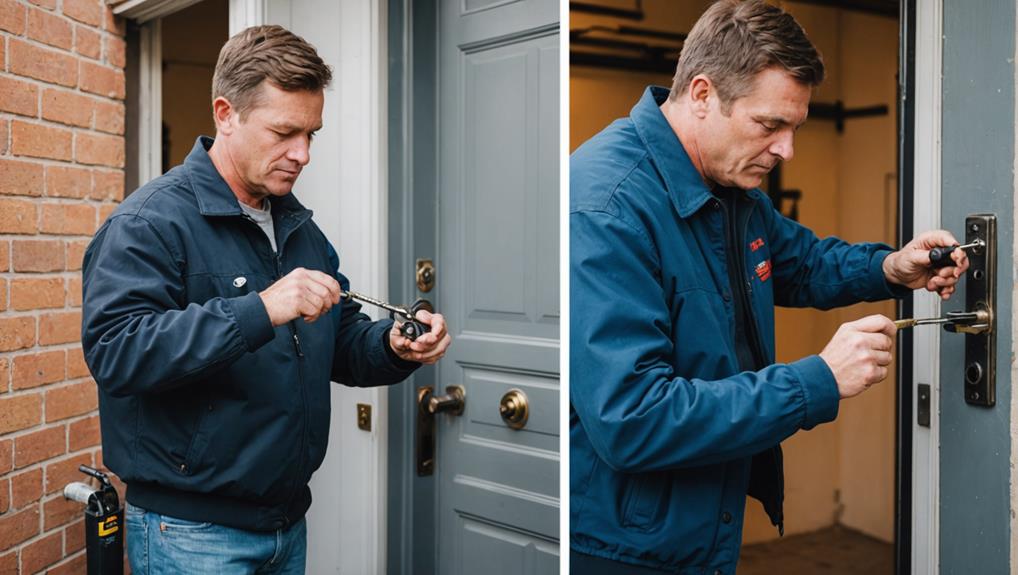
When facing a lock emergency, the choice between DIY solutions and professional help can feel overwhelming. You want to serve your community effectively, and knowing when to take matters into your own hands versus calling in an expert is essential.
DIY Solutions vs. Professional Help
| Aspect | DIY Solutions | Professional Help |
|---|---|---|
| Cost | Generally lower, minimal tools needed | Higher, includes service fees |
| Time | Can be quick if you're experienced | May take longer but guarantees thoroughness |
| Skill Requirements | Basic lock knowledge needed | Advanced skills and specialized tools |
If you have the right skills and tools, DIY might be a tempting option. However, consider whether you can truly solve the issue without risking further damage. On the other hand, professionals bring expertise and can guarantee the job is done right the first time, providing peace of mind. Ultimately, weigh your own abilities against the urgency of the situation. Your choice will impact not just your immediate safety, but also your ability to serve others effectively.
Long-term Security Strategies
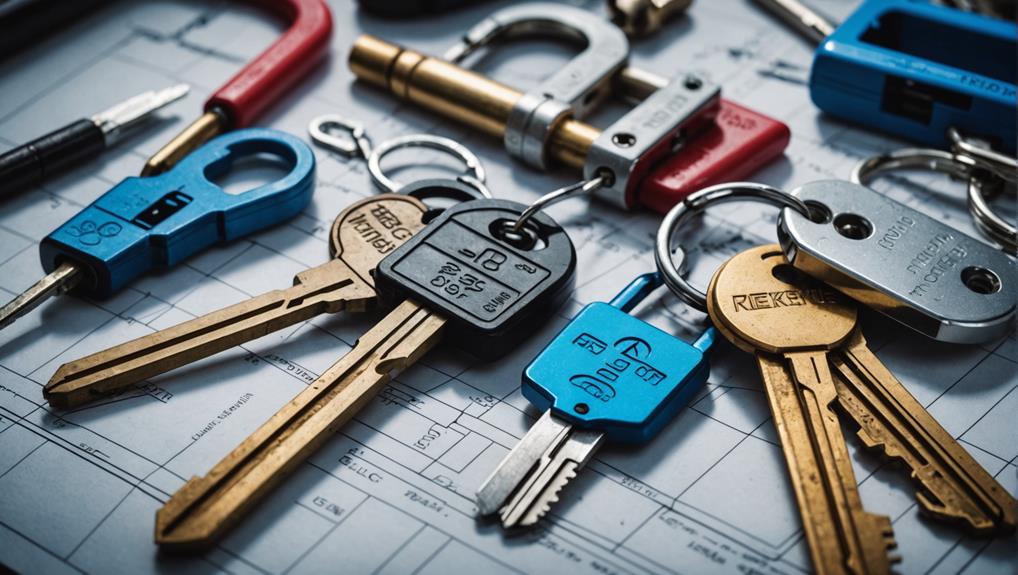
To guarantee your home remains secure over the long haul, it's vital to develop and implement effective security strategies. One effective approach is to evaluate re-keying locks when moving into a new home or after losing a key, as it can be a more cost-effective solution compared to replacing locks entirely, allowing you to unlock savings while maintaining security.
By prioritizing your security, you not only protect your belongings but also create a safer environment for your loved ones and neighbors.
- Regularly update your locks: Verify your locks are up-to-date and functioning properly to prevent unauthorized access.
- Invest in a security system: A reliable security system can deter potential intruders and provide peace of mind for you and your community.
- Educate your family: Make certain everyone knows safety protocols, such as how to secure doors and windows, and the importance of not sharing access codes.
Building a thorough security plan requires consistent effort. It's important to assess your home's vulnerabilities and address them proactively.
By involving family members in these discussions, you foster a collective sense of responsibility and awareness. Empowering others to take part in these strategies not only enhances security but also strengthens community bonds.
Making the Right Choice
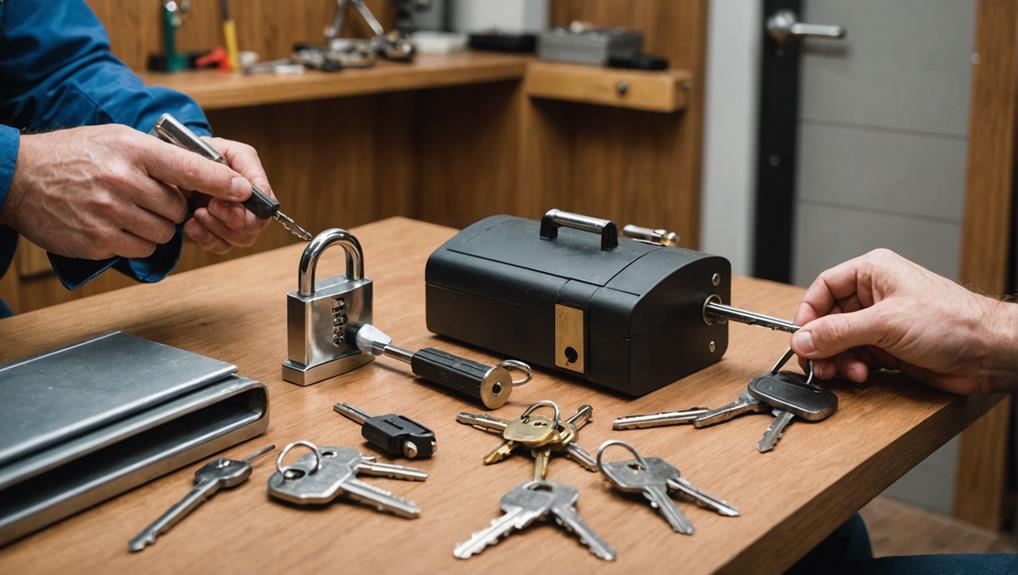
When you're faced with a lock issue, weighing the cost-effectiveness of re-keying versus lock replacement is essential.
Re-keying involves changing the internal workings of a lock so that it can be operated by a new key, which can be a more affordable and quicker solution in many cases.
Consider how much time you can save in the process, as emergencies often demand quick solutions.
Understanding lock re-keying can help you make an informed decision.
Making the right choice can greatly affect both your wallet and your peace of mind.
Cost-Effectiveness Analysis
Cost-effectiveness is an essential factor in deciding between re-keying and lock replacement during emergencies. When you're faced with a security issue, your budget matters just as much as the safety of those you serve. Understanding the costs involved can help guarantee you make the right choice for both your wallet and your community.
- Re-keying typically costs less than replacing the entire lock.
- Lock replacement might be necessary if the lock is damaged or outdated.
- Consider the long-term value of investing in a high-quality lock versus a simple re-key.
Re-keying is often the more economical choice, especially if the current locks are in good condition. It can provide the same security level without the expense of new hardware.
However, if you're dealing with frequent issues or outdated systems, it might be wiser to invest in quality replacements, guaranteeing long-term safety for those you care for.
Ultimately, weigh the immediate costs against the potential benefits, and consider how each option aligns with your commitment to serving others effectively. Your decision should reflect not only your budget but also the security needs of the people you support.
Time-Saving Considerations
In emergency situations, time is of the essence, and the choice between re-keying and lock replacement can greatly impact how quickly you regain security. If you find yourself locked out or facing a security breach, you want a solution that minimizes downtime.
Re-keying typically takes less time than replacing an entire lock, allowing you to get back to your routine faster. When you opt for re-keying, a skilled locksmith can usually complete the job in under an hour. This means you can address the immediate concern without the hassle of waiting for a new lock to be ordered and installed.
Plus, re-keying doesn't require you to change the entire lock mechanism, which can be a lengthy process. Choosing re-keying also means you can maintain your existing hardware, saving time on installation and adjustment.
In emergencies, it's vital to act quickly and efficiently. By selecting re-keying, you're not only ensuring your security but also providing a swift solution for yourself and anyone who relies on your timely response.
Frequently Asked Questions
Can I Re-Key a Lock Myself Without Special Tools?
Yes, you can re-key a lock yourself without special tools, but it's often easier with a re-keying kit designed for your specific lock type.
These kits typically include everything you need, like new pins and a follower. Just make certain you follow the instructions carefully.
If you're unsure or the lock's complicated, it might be worth calling a locksmith to guarantee it's done right and keeps your space secure.
How Often Should I Consider Re-Keying My Locks?
You should consider re-keying your locks whenever there's a change in your living situation, like moving into a new home or experiencing a breakup.
It's also wise to re-key if you've lost a key or if you suspect someone unauthorized may have access.
Regularly reassessing your security can help guarantee your safety.
Staying proactive about your locks helps protect not just you, but also those you care about.
Are There Types of Locks That Cannot Be Re-Keyed?
Did you know that about 70% of residential locks can be re-keyed? However, not all locks fit this category.
Some high-security locks, electronic locks, and certain antique locks can't be re-keyed due to their specific mechanisms.
If you're looking to serve others by ensuring their security, it's crucial to know these details.
Always check the type of lock before making decisions, so you can provide the best recommendations for safety.
What Should I Do if I Lose My Keys?
If you lose your keys, first stay calm and retrace your steps.
Check common places like your pockets, bags, or around your home.
If you can't find them, consider calling a locksmith who can help.
You might need to re-key your locks for security.
Alternatively, if you're worried about lost keys being misused, replacing the locks could be a better option.
Always prioritize your safety and peace of mind.
Will Re-Keying Affect the Warranty on My Locks?
Did you know that 70% of homeowners don't realize re-keying their locks won't void the warranty?
When you decide to re-key, you're enhancing security without needing to replace the entire lock. Most manufacturers allow this adjustment, so your warranty typically stays intact.
Always check with the manufacturer's guidelines, just to be safe.
You're not just protecting your home; you're also ensuring peace of mind for yourself and those you serve.
Conclusion
Choosing between re-keying and lock replacement can noticeably impact your security and budget. If you need a quick fix, re-keying's often your best bet, while replacement offers long-term peace of mind. In emergencies, weigh your options carefully: consider your immediate needs, evaluate your lock type, and assess your security concerns. By understanding both methods, you'll make an informed decision that safeguards your home today and tomorrow, ensuring you feel secure in every situation you face.

